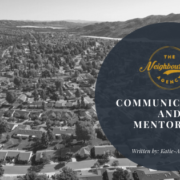Communications & Mentorship: A Neighbour’s Perspective
Let me introduce myself. My name is Katie-Ann Wallace, and I am an Account Coordinator at The Neighbourhood Agency. This is my first “real gig” since graduating from University. I’ve learned a lot since joining The Neighbourhood, not the least of which is that great mentors are an integral part of my development. So, I thought I would provide some insights into the world of mentorship, and my research into this space.
In April 2019, as my final assignment before graduation, I submitted my undergraduate thesis on mentorship, specifically the relationship within mentorships. I chose this topic on behalf of personal lessons and tips I’ve learned through my years being a mentee. Mentorship is a necessary foundation for growth, in my opinion, and during my research I highlighted the benefits of the relationship on both parties involved.
My thesis was developed on a list of questions I had regarding mentorship in the field and how to make the most of learning from individuals who would be considered “OG’s” in the communications space. I wanted to get an understanding of who and where was offering mentorship. What did that look like? Was it a program or an individualized set up? And for professionals currently working in Communications, what did mentorship look like when they were starting? I was a soon-to-be new graduate and had received quite a bit of mentorship very early, but after speaking to my peers I was curious why having mentors wasn’t more common.
I started my research looking through countless academic journals which reported on the effects mentorship has on new professionals and the contribution it makes to their continued success. Mentorship has been prominent in medicine, engineering and business. In some cases, it was a requirement that new hires be paired with seasoned professionals to assist in laying an optimal foundation for their success in a company or in their field in general. Often times those mentorships would result in mentors naming their protégés and successors. Mentorship is an opportunity to groom individuals for success. Business, medicine and engineering are just a few of the fields that seem to have a strong and well documented understanding of how and where it plays a large role in development.
Communications, unfortunately, was not as well documented. The articles and journals reporting on the field were few and far between. Mentorship did exist, but was harder to glean any insights.
There are a couple of major Communications organizations in the Canadian market, though, including the Canadian Public Relations Society (CPRS). As a public relations major, CPRS was known throughout my four years as the go-to organization for Communications professionals. It was considered the place to start making the majority of your connections for both formal and informal mentorships, job opportunities, and overall learning within the community. While interviewing my participants, however, I found many of them did not use formal programs to seek mentors. This was due to lack of options, and many programs required financial contribution and time. Not everyone was able to contribute both while being a full-time student or working full-time. As a result, participants recalled being in their first or second job and realizing they needed more support beyond watching their superiors work and asking questions. They recall raising their hands to the person they admired the most and simply asking for the extra support and eventually developing a mutually beneficial relationship.
Mentorship has received quite a bit of attention in recent years. Highly successful individuals are now constantly speaking on the benefits of mentorship when developing skills and all-around confidence in work and life. As a result, there has also been an influx of mentorship programs across many fields.
I found the concept “closed mouths don’t get fed” tends to ring true when seeking informal mentorship. These are the relationships developed through research and simply reaching out. Participants recalled seeking these relationships from individuals they admired. They were individuals chosen by the mentee as opposed to being appointed. They were often the longest lasting mentee-mentor relationships and would crossover between gaining skills in the work place, to having an individual to advocate for them and guide them through personal obstacles and large-scale life events.
And through it all, though quite a few people I spoke with had seen great benefits from mentorship in the past, most of them were not currently mentoring anyone. I found this interesting as they had such positive experiences with developing these relationships, it would be assumed that they would reciprocate. When asked “why they were not mentoring?”, the most common answer was time and lack of outreach. No one was asking. Some participants were mentoring through work appointed programs, often interns. And one participant was receiving mentorship in several different career-focused areas as she was expanding and diversifying her skillset. My question at this point is why weren’t they being asked? New graduates, current students and new professionals should be yearning to learn from their seasoned counter parts. But, do they know these opportunities exist and how to set the motion of acquiring them?
Wanting a mentor is one thing. Knowing how to start that conversation is another step for young professionals. Aside from wanting to learn from a mentor, a mutually beneficial relationship where both partners get something out of it, will ensure a long lasting and supportive partnership.
As communicators, how do we help create a foundation for new professionals to receive the tools they need to have lasting careers? To begin with, schools can develop more programs outside of co-ops and internships that get the wheels turning and connecting students to individuals in the field during their studies. I’m sure there are a multitude of other ways to encourage more mentorship opportunities within the Communications world, and would love to hear your thoughts on this subject too.

